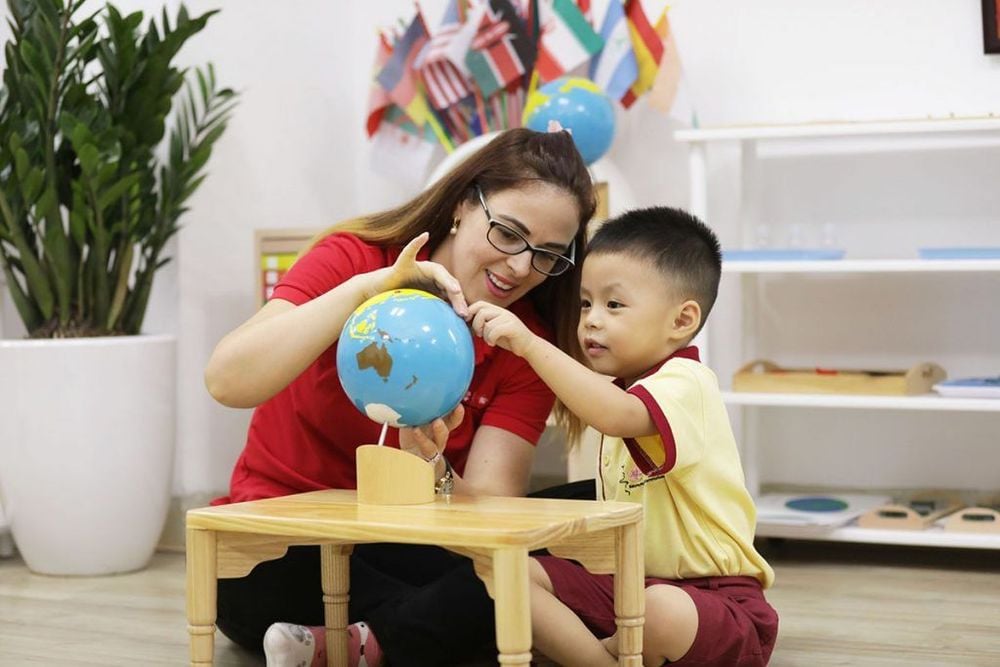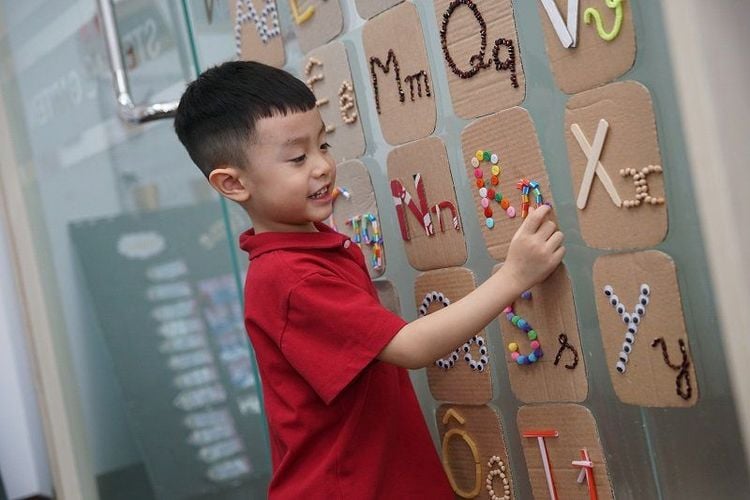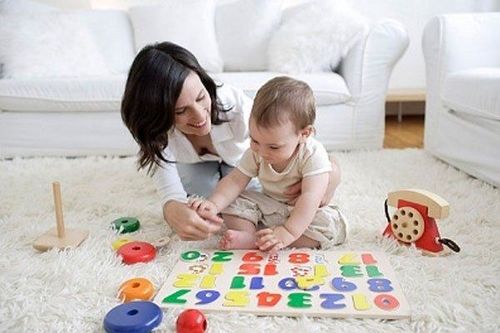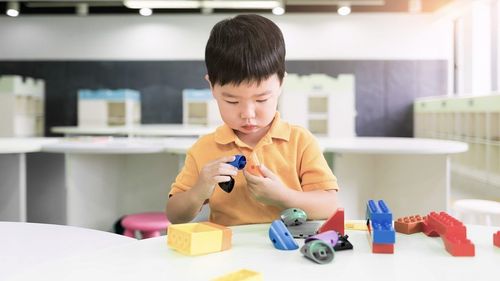This is an automatically translated article.
To perfect reading skills, children need to have a relatively rich vocabulary. Therefore, parents should be proactive in developing children's vocabulary from an early age. This plays a very important role in other reading comprehension skills.1. Read books with children
Children develop language and increase vocabulary in only one way - listening to those around them. The richer and richer the language children hear every day, the better their vocabulary is developed. However, beyond casual conversation, you have lots of fun creative ways to increase your child's vocabulary. It can start with building family relationships and creating bonds between members.
Of course, you've been reading to your baby since birth, but try reading books with characters and plots. Take time to discuss and point out new words and concepts to your child.
Never underestimate the importance of good conversation and information for vocabulary development.
2. Reading aloud is also a way to develop children's vocabulary
Actually reading aloud is a great way for children to be exposed to new words. Parents should choose books that are of interest to preschoolers and use words that are slightly beyond their child's understanding.
You can work with your child to learn what they mean, using the context, other words on the page, and any images that may be on the page.

Cách để phát triển vốn từ vựng cho con được tốt nhất
3. Go to the library with your child
Many studies have shown that there is a link between regular library visits and children's literacy skills. When children are in a place with a lot of books and materials, they always feel more interested in reading. In addition, nowadays, some libraries often have interesting activities for children, so this is an effective way to develop children's vocabulary that parents should apply.4. Use synonyms instead
Parents are children's first teachers, so parents should use a variety of words to expand their vocabulary. The use of synonyms in different contexts can bring about different nuances. Therefore, it is recommended to regularly apply these words to daily activities for the purpose of developing children's vocabulary. For example, the synonym of the word "give" has "give", "give"..., each word has its own nuance and can be used in different contexts.5. Teach children about the alphabet carefully
Parents should often sing alphabet songs with their children to make them easier to remember and more confident when learning. There are games that help children expand their alphabet-based vocabulary, such as naming objects with the first letter in alphabetical order. In addition, you can also find some interesting online games related to the alphabet.

Bố mẹ là thầy cô đầu tiên của trẻ, vì thế bố mẹ nên sử dụng từ ngữ đa dạng để trẻ được mở rộng vốn từ
6. Use a lot of descriptive adjectives
One of the ways to develop vocabulary for preschool children is to use many adjectives to describe. Because the more words they hear each day, the more they will absorb and gradually know how to use the words they have learned. When talking about something, parents should use many adjectives to describe it. For example, words like “smooth”, “soft”, “colorful”, “light”... can be used to talk about a shirt a child was given as a gift. Children will learn how to use many words, even difficult ones, through these ways.7. Label familiar objects
To help children understand and easily recognize words, parents can help by labeling familiar objects and writing their names. For example, when classifying toys for children, parents need to specify the name: "Lego", "doll", "car"...
8. Show your child pictures
With help and support from parents, children can see or visualize the words they hear. For example, when children hear the word a certain word, parents should find the right picture for the child to see. Because for young children, seeing is learning. Besides, to help cultivate rich vocabulary in children, parents can use vocabulary flashcards or pictures in books and magazines.
Cho trẻ xem hình ảnh cũng là một cách để giúp trẻ phát triển ngôn ngữ được tốt nhất
9. Read in rhyme
Rhyming is not only fun, but it also helps children think about the relationship between different words. Read to your child often books of poetry and rhymes and quiz them to find rhyming words.10. Read aloud with your child
Reading aloud with children will help strengthen the bond between parents and children, and expose children to many new words. To help children be more interested in stories, parents should choose topics that children love, including words that are a bit difficult for children to understand. Then, work with your child to learn the meaning of new words by building on the context and pictures in the book while reading to them.11. Focus on new words
In the daily activities themselves, parents can also introduce children to many new words. Parents can explain that chicken is a type of poultry when taking their children to the supermarket. Or children will have the opportunity to be familiar with concepts such as mammals or reptiles when they go to the zoo.
In addition, to help children understand the meaning of new words, parents should also explain those words in detail. For example, instead of just asking if the child would like to wear a yellow shirt? You can ask the child what happens when the yellow pressure is applied?

Cùng trẻ đọc to thành tiếng sẽ giúp tăng cường sự gắn kết giữa bố mẹ và con, đồng thời cho trẻ tiếp xúc với nhiều từ mới
12. Expand vocabulary based on child's interests
When children are talked about what interests them, they will be very interested and learn new words very quickly. Therefore, when children share with parents about their hobbies, parents should use some new words that children do not know. For example, when children talk about extinct animals, explain the work of archaeologists. Children can remember long phrases easily because shorter words with similar letters are easy to confuse children. Most preschoolers can memorize the names of all kinds of animals that adults can barely pronounce. Because a child's mind is like a sponge.13. Help your child speak in a different way
In the process of developing children's vocabulary, parents should not point out mistakes, but repeat the children's ideas, but use more correct and correct words or phrases when children say it wrong or missing. For example, when a child asks for milk, parents can say: "I'll get you a cup of milk to drink while eating bread!".
Parents should be gentle when talking to their children, and patiently model the correct use of words for children to follow.
14. Let children practice
To develop vocabulary for preschool children, one of the most effective methods is to create opportunities for children to talk as much as possible. First of all, parents should turn off the TV, phone and other electronic devices. Thus, parents can better understand the child's meaning, and help the child understand the clear and appropriate expression.
Through daily activities, parents should also encourage children to share their thoughts and ideas. For example, parents talk about things happening around the child and ask relevant questions for the child to answer. In addition, when talking with children, parents should pay attention to showing comfort, excitement and joy. When every story happens in a natural and interesting way, children will learn and develop their vocabulary better.
As you can see, developing vocabulary for preschool children is not difficult, but it needs to be prepared when children start their reading journey, so that children can cooperate and bring good results.
For more tips on raising smart children and helping them have many skills in life, parents can consult experts and qualified doctors at Vinmec International General Hospital for advice. more detailed advice.
Please dial HOTLINE for more information or register for an appointment HERE. Download MyVinmec app to make appointments faster and to manage your bookings easily.
Reference source: babycenter.com - verywellfamily.com













